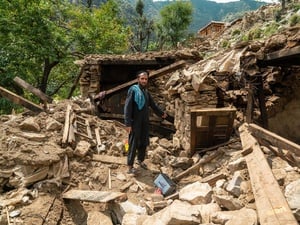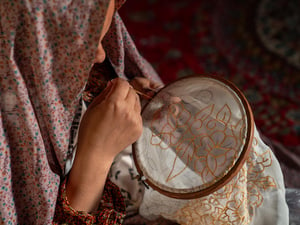UNHCR clears obstacles to return of Afghan refugees
UNHCR clears obstacles to return of Afghan refugees

UNHCR staff writing down the details of a group returning from Roghani camp to Afghanistan under the Facilitated Group Return programme.
QUETTA, Pakistan, Sept 25 (UNHCR) - Among the hundreds of thousands of Afghans heading home from Pakistan this year are the first groups repatriating under a UNHCR programme that seeks solutions to specific problems in Afghanistan that had prevented their return.
By yesterday, three groups - 59 families and 318 individuals - had left Chaman refugee camps in Balochistan for the bordering Afghan town of Spin Boldak under the UN refugee agency's Facilitated Group Returns (FGR) programme.
The refugees had bought land to settle but, under the scheme, UNHCR stepped in to provide extra assistance, such as well installation, that made this move a viable solution to their problem.
"We are Pashtuns originally from Shibirghan, the provincial capital of Jawzjan province. After spending around two years in this camp we have decided to go back to Afghanistan," said Abdul Rauf, a refugee in Roghani camp who led a group of 22 families that left Chaman on September 16.
That group of 22 was the first of a total of 705 families who have asked to go back to Afghanistan under the FGR programme from different camps in Balochistan. A second group comprising 21 families and 87 individuals left on September 23.
"The 705 families that will gradually return in several groups have bought land in the south bordering the town of Spin Boldak as they cannot return to their places of origin in the north due to their lack of confidence in the security conditions there," said Abdul Rauf.
He said they had considered returning to Jawzjan province, but after much thought, it became evident that repatriation to their places of origin was out of the question because of the uncertain security situation. Instead they bought land and decided to settle in Spin Boldak.
"These 705 families were identified during the UNHCR Shura repatriation meetings held in camps," said Zelmira Sinclair, Head of the Repatriation Unit in UNHCR's Quetta office.
"In these meetings, UNHCR shares information with refugees, helping them make a voluntary decision to repatriate. Refugees in response share specific problems impeding their return. The problem is relayed to the UNHCR Afghanistan office for action," she explained. "Once UNHCR Afghanistan conveys that the problem can be solved, we go back to negotiate with the group about their return and facilitate the repatriation."
Sinclair said the 705 families had bought land but had no water supply system and also lacked shelter material. UNHCR Kandahar installed tube wells on the land of the first two groups, while work is underway on the other area.
For these groups, UNHCR had also developed a special package in addition to its regular assistance. The additional package includes for each family $50 for support and $13 for latrines. Each family is also entitled to a shelter package including tool kits, iron beams for two rooms, a metal door, metal windows and latrine slabs.
Abdul Baseer, another refugee who returned with the first group, said he had a family of eight and had decided to go back because he did not see a future in Pakistan, waiting in the border camp for ration handouts.
"For how long we will have to survive like this, depending on help from aid agencies? I think this is good that UNHCR is helping us to start a respectable life back in our own country," he said.
Filippo Grandi, UNHCR Chief of Mission in Kabul, endorsed the concept of being more target-oriented to solve returnee problems.
"We have to identify a solution by targeting areas where people are willing to return. We know that there are problems which UNHCR cannot handle, but we have to be specific about the ones which we can, so that people, after having their problems solved, can go back," he said.
These groups that crossed over the Chaman border into Afghanistan from Pakistan in September were among more than 308,000 Afghans who have returned this year, including 50,000 from Balochistan.









